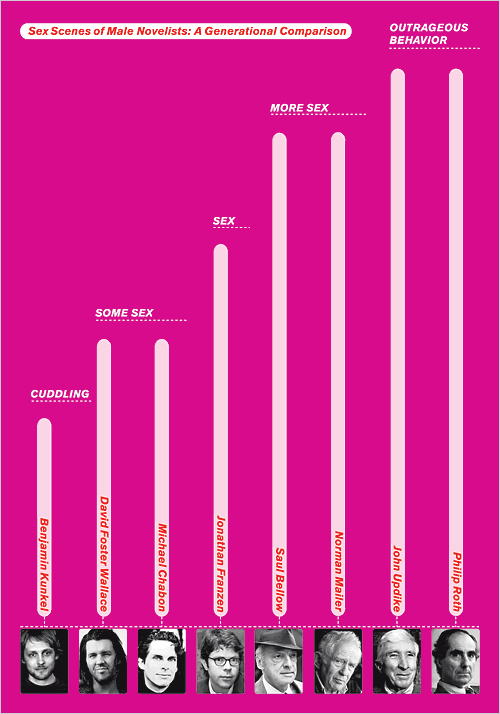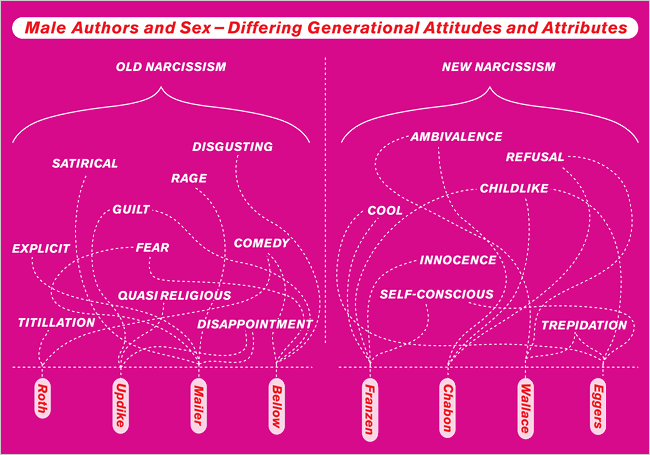: sexo, pudor y literatura
Este estupendo ensayo de Katie Roiphe para el New York Times pone en evidencia (con gráficas y todo) el hecho de que la nueva generación de narradores varones norteamericanos son, por decir lo menos, unos mojigatos con respecto al sexo. Si aplicáramos esta gráfica a nuestro continente narrativo nacional, comparando, digamos, a la Generación de Medio Siglo (Pacheco, García Ponce, Elizondo, Pitol...) con la nuestra, la representación gráfica de nuestras novelas al lado de las de ellos, quedaría por los suelos. Como generación de narradores (varones) somos unos cyborgs, escribimos sin el cuerpo, de forma aséptica, sin ensuciarnos apenas; si la revolución que pretendían nuestros predecesores era precisamente de carácter sexual, la nuestra no es más que una revolución profiláctica y llena de temores hacia el cuerpo del otro (lecciones de la influenza A H1N1 en su versión más reciente). Me llamó la atención que varias de las ideas de Katie Roiphe con respecto a la nueva generación de narradores norteamericanos coinciden con el texto que sirvió como prólogo a Grandes Hits vol. 1 (Almadía, 2008). Pero, bueno, vean que sucede con los narradores del norte, que Roiphe califica como "too cool for sex".
At this point, one might be thinking: enter the young men, stage right. But our new batch of young or youngish male novelists are not dreaming up Portnoys or Rabbits. The current sexual style is more childlike; innocence is more fashionable than virility, the cuddle preferable to sex. Prototypical is a scene in Dave Eggers’s road trip novel, “You Shall Know Our Velocity,” where the hero leaves a disco with a woman and she undresses and climbs on top of him, and they just lie there: “Her weight was the ideal weight and I was warm and wanted her to be warm”; or the relationship in Benjamin Kunkel’s “Indecision”: “We were sleeping together brother-sister style and mostly refraining from outright sex.”
Characters in the fiction of the heirs apparent are often repelled or uncomfortable when faced with a sexual situation. In “Infinite Jest,” David Foster Wallace writes: “He had never once had actual intercourse on marijuana. Frankly, the idea repelled him. Two dry mouths bumping at each other, trying to kiss, his self-conscious thoughts twisting around on themselves like a snake on a stick while he bucked and snorted dryly above her.” With another love interest, “his shame at what she might on the other hand perceive as his slimy phallocentric conduct toward her made it easier for him to avoid her, as well.” Gone the familiar swagger, the straightforward artistic reveling in the sexual act itself. In Kunkel’s version: “Maybe I was going to get lucky, something which, I reminded myself, following her up the stairs to our room and giving her ass a good review, wasn’t always a piece of unmixed luck, and shouldn’t automatically be hoped for any more than feared.”
Rather than an interest in conquest or consummation, there is an obsessive fascination with trepidation, and with a convoluted, postfeminist second-guessing. Compare Kunkel’s tentative and guilt- ridden masturbation scene in “Indecision” with Roth’s famous onanistic exuberance with apple cores, liver and candy wrappers in “Portnoy’s Complaint.” Kunkel: “Feeling extremely uncouth, I put my penis away. I might have thrown it away if I could.” Roth also writes about guilt, of course, but a guilt overridden and swept away, joyously subsumed in the sheer energy of taboo smashing: “How insane whipping out my joint like that! Imagine what would have been had I been caught red-handed! Imagine if I had gone ahead.” In other words, one rarely gets the sense in Roth that he would throw away his penis if he could.
The literary possibilities of their own ambivalence are what beguile this new generation, rather than anything that takes place in the bedroom. In Michael Chabon’s “Mysteries of Pittsburgh,” a woman in a green leather miniskirt and no underwear reads aloud from “The Story of O,” and the protagonist says primly, “I refuse to flog you.” Then take the following descriptions from Jonathan Franzen’s novel “The Corrections”: “As a seducer, he was hampered by ambivalence.” “He had, of course, been a lousy, anxious lover.” “He could hardly believe she hadn’t minded his attacks on her, all his pushing and pawing and poking. That she didn’t feel like a piece of meat that he’d been using.” (And of course there are writers like Jonathan Safran Foer who avoid the corruptions of adult sexuality by choosing children and virgins as their protagonists.)
The same crusading feminist critics who objected to Mailer, Bellow, Roth and Updike might be tempted to take this new sensitivity or softness or indifference to sexual adventuring as a sign of progress (Mailer called these critics “the ladies with their fierce ideas.”) But the sexism in the work of the heirs apparent is simply wilier and shrewder and harder to smoke out. What comes to mind is Franzen’s description of one of his female characters in “The Corrections”: “Denise at 32 was still beautiful.” To the esteemed ladies of the movement I would suggest this is not how our great male novelists would write in the feminist utopia.
The younger writers are so self- conscious, so steeped in a certain kind of liberal education, that their characters can’t condone even their own sexual impulses; they are, in short, too cool for sex. Even the mildest display of male aggression is a sign of being overly hopeful, overly earnest or politically un toward. For a character to feel himself, even fleetingly, a conquering hero is somehow passé. More precisely, for a character to attach too much importance to sex, or aspiration to it, to believe that it might be a force that could change things, and possibly for the better, would be hopelessly retrograde. Passivity, a paralyzed sweetness, a deep ambivalence about sexual appetite, are somehow taken as signs of a complex and admirable inner life. These are writers in love with irony, with the literary possibility of self-consciousness so extreme it almost precludes the minimal abandon necessary for the sexual act itself, and in direct rebellion against the Roth, Updike and Bellow their college girlfriends denounced. (Recounting one such denunciation, David Foster Wallace says a friend called Updike “just a penis with a thesaurus”).
This generation of writers is suspicious of what Michael Chabon, in “Wonder Boys,” calls “the artificial hopefulness of sex.” They are good guys, sensitive guys, and if their writing is denuded of a certain carnality, if it lacks a sense of possibility, of expansiveness, of the bewildering, transporting effects of physical love, it is because of a certain cultural shutting down, a deep, almost puritanical disapproval of their literary forebears and the shenanigans they lived through.
In a vitriolic attack on Updike’s “Toward the End of Time,” David Foster Wallace said of the novel’s narrator, Ben Turnbull, that “he persists in the bizarre adolescent idea that getting to have sex with whomever one wants whenever one wants is a cure for ontological despair,” and that Updike himself “makes it plain that he views the narrator’s impotence as catastrophic, as the ultimate symbol of death itself, and he clearly wants us to mourn it as much as Turnbull does. I’m not especially offended by this attitude; I mostly just don’t get it.”
In this same essay, Wallace goes on to attack Updike and, in passing, Roth and Mailer for being narcissists. But does this mean that the new generation of novelists is not narcissistic? I would suspect, narcissism being about as common among male novelists as brown eyes in the general public, that it does not. It means that we are simply witnessing the flowering of a new narcissism: boys too busy gazing at themselves in the mirror to think much about girls, boys lost in the beautiful vanity of “I was warm and wanted her to be warm,” or the noble purity of being just a tiny bit repelled by the crude advances of the desiring world.
After the sweep of the last half-century, our bookshelves look different than they did to the young Kate Millett, drinking her nightly martini in her downtown apartment, shoring up her courage to take great writers to task in “Sexual Politics” for the ways in which their sex scenes demeaned, insulted or oppressed women. These days the revolutionary attitude may be to stop dwelling on the drearier aspects of our more explicit literature. In contrast to their cautious, entangled, ambivalent, endlessly ironic heirs, there is something almost romantic in the old guard’s view of sex: it has a mystery and a power, at least. It makes things happen.
Kate Millett might prefer that Norman Mailer have a different taste in sexual position, or that Bellow’s fragrant ladies bear slightly less resemblance to one another, or that Rabbit not sleep with his daughter-in-law the day he comes home from heart surgery, but there is in these old paperbacks an abiding interest in the sexual connection.
Compared with the new purity, the self-conscious paralysis, the self-regarding ambivalence, Updike’s notion of sex as an “imaginative quest” has a certain vanished grandeur. The fluidity of Updike’s Tarbox, with its boozy volleyball games and adulterous couples copulating al fresco, has disappeared into the Starbucks lattes and minivans of our current suburbs, and our towns and cities are more solid, our marriages safer; we have landed upon a more conservative time. Why, then, should we be bothered by our literary lions’ continuing obsession with sex? Why should it threaten our insistent modern cynicism, our stern belief that sex is no cure for what David Foster Wallace called “ontological despair”? Why don’t we look at these older writers, who want to defeat death with sex, with the same fondness as we do the inventors of the first, failed airplanes, who stood on the tarmac with their unwieldy, impossible machines, and looked up at the sky?

